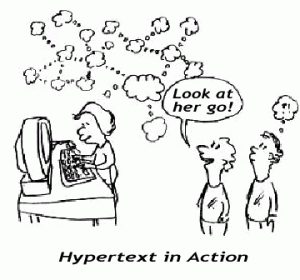“As most computerised programs are a simulation of something real and physical, the blog is essentially a simulation of a diary or journal.”
This was a really interesting thought from Mia’s blog. She goes on to say how a blog is different because of hypertext and it can continually link to more information. I wonder if you suggest websites or other books for your readers to check out at the end of a book if that is still considered hypertext even though its not online.
Seonaid explored more about what it is to be network literate, which we also touched on in the lecture yesterday. Changing the themes on our blogs, is that bringing us closer to being network literate? Not really. They designed it for us to personally change at our convenience but the coders are the ones we have being doing all the hard work. In the Network Media blog, Adrian linked us to some websites, here and here, that are providing students with the skills working towards being network literate.
Code.org is an organisation that is aimed at giving access to all students to learn computer programming. They really emphasise the importance of learning basic coding for our generation.
Karlee brought up an interesting point on how hyperlinks don’t make books irrelevant “but rather, they will exist simultaneously and dependent on each other.” I also want books to be around for a long time even though I feel like it is slowly dying medium. There is definitely a shift towards e-books and online material opposed to buying/borrowing books. I think it will definitely be around for our generation since we grew up with books but perhaps the next generation won’t have that sentimental connection to it.
